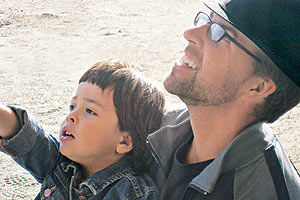The Age of Empathy: Nature's Lessons for a Kinder Society, by Frans de Waal (Harmony Books): We often fancy that chimps and other nonhuman primates live in a state of constant competition and violence—an image, we fear, that also applies to human beings.
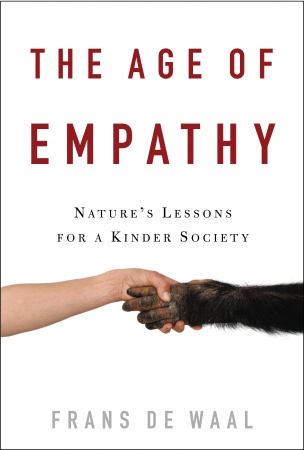 In The Age of Empathy, leading primatologist Frans de Waal draws on decades of research to reveal that evolution has bequeathed capacities for empathy, compassion, and sharing to all primates, humans included. The really hard question: What conditions allow goodness to flourish? The Age of Empathy doesn’t attempt to design a human utopia, but it does suggest that attempts to build a more shareable society are necessary and natural. “In fact,” Dr. de Waal writes, “I’d argue that biology constitutes our greatest hope. One can only shudder at the thought that the humaneness of our societies would depend on the whims of politics, culture or religion.”
In The Age of Empathy, leading primatologist Frans de Waal draws on decades of research to reveal that evolution has bequeathed capacities for empathy, compassion, and sharing to all primates, humans included. The really hard question: What conditions allow goodness to flourish? The Age of Empathy doesn’t attempt to design a human utopia, but it does suggest that attempts to build a more shareable society are necessary and natural. “In fact,” Dr. de Waal writes, “I’d argue that biology constitutes our greatest hope. One can only shudder at the thought that the humaneness of our societies would depend on the whims of politics, culture or religion.”
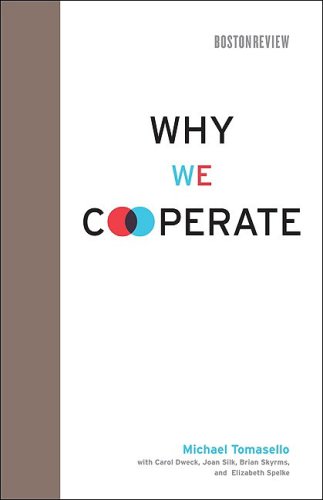 Why We Cooperate, by Michael Tomasello (Boston Review Books): Tomasello, co-director of the Max Planck Institute for Evolutionary Anthropology, studied the cooperative behavior of one-year-old children—and compared it to that of apes. The results, which build on decades of similar studies, show that even preverbal children have a natural inclination to share and help others, much more so than nonhuman primates (this doesn’t contradict de Waal’s argument in The Age of Empathy; it just means our cooperative behavior is more evolved). Remarkably, Tomasello includes critiques of his argument by four other leading scientists, many of whom debate his interpretations of the facts—thereby embedding his cooperative values in the book itself. Why We Cooperate is a scientific treatise, and it might be a trifle dry for some tastes—but its data and arguments are critical to our understanding of ourselves as species. (Folks interested in the science of human empathy and cooperation might also read Born to Be Good, by my former Greater Good colleague Dacher Keltner, which was published in January 2009.)
Why We Cooperate, by Michael Tomasello (Boston Review Books): Tomasello, co-director of the Max Planck Institute for Evolutionary Anthropology, studied the cooperative behavior of one-year-old children—and compared it to that of apes. The results, which build on decades of similar studies, show that even preverbal children have a natural inclination to share and help others, much more so than nonhuman primates (this doesn’t contradict de Waal’s argument in The Age of Empathy; it just means our cooperative behavior is more evolved). Remarkably, Tomasello includes critiques of his argument by four other leading scientists, many of whom debate his interpretations of the facts—thereby embedding his cooperative values in the book itself. Why We Cooperate is a scientific treatise, and it might be a trifle dry for some tastes—but its data and arguments are critical to our understanding of ourselves as species. (Folks interested in the science of human empathy and cooperation might also read Born to Be Good, by my former Greater Good colleague Dacher Keltner, which was published in January 2009.)
 A Paradise Built in Hell: The Extraordinary Communities That Arise in Disaster
A Paradise Built in Hell: The Extraordinary Communities That Arise in Disaster, by Rebecca Solnit (Viking): We often imagine that in a disaster, it’s every one for him- or herself. This is the image we’ve seen in countless movies about earthquakes, volcanoes, hurricanes, terrorist attacks, and fires. But research has found that this is the opposite of the truth: in the midst of disaster, people are more likely to pull together and share resources in order to survive. In A Paradise Built in Hell, National Book Award-winner Rebecca Solnit roams from the 1906 San Francisco earthquake to 9/11 to Hurricane Katrina, and beyond, in order to reveal the altruism, cooperation, and mutual aid that spontaneously emerge when we face collective threats. “The recovery of this purpose and closeness without crisis or pressure”—without disaster—“is the great contemporary task of being human,” she concludes.
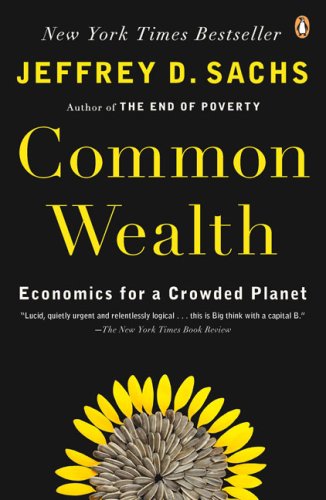 Common Wealth: Economics for a Crowded Planet
Common Wealth: Economics for a Crowded Planet, by Jeffrey D. Sachs (Penguin): Sachs is a complicated figure. He’s a neoliberal technocrat and the architect of some of the last century’s biggest economic disasters—but in the twenty-first century he’s become a leading advocate of global wealth sharing, arguing that targeted aid could eradicate extreme poverty in two decades. In Common Wealth, Sachs takes his ideas one step further and proposes planet-wide sharing as a solution to global warming, population pressures, poverty, and other problems. Sachs has a tendency to write from the Ivory Tower—he’s one of those would-be philosopher kings who are forever designing utopias—but we appreciate his thoughtfully empirical approach, and his chastened ideas should be considered by anyone who wants to build a more compassionate world.
 Green Metropolis: Why Living Smaller, Living Closer, and Driving Less are the Keys to Sustainability
Green Metropolis: Why Living Smaller, Living Closer, and Driving Less are the Keys to Sustainability, by David Owen (Riverhead): In Green Metropolis, New Yorker writer David Owen convincingly argues that the best thing any of us can do for the environment is to encourage the growth of livable, shareable cities, the ultimate in human habitats. Owen starts by pointing out that Manhattan residents have the smallest carbon footprints in the country. "The city’s efficiencies, like the efficiencies of all dense urban cores, are built into the fabric of the place, and they don’t depend on an unprecedented commitment to sacrifice and compliance by environmentally concerned citizens," says Owen in our Shareable.net Q&A. This is not a perfect book—its chapters feel like a string of magazine articles—but its case for urbanism as a path to a more sharing, sustainable society is one that Americans need to hear.
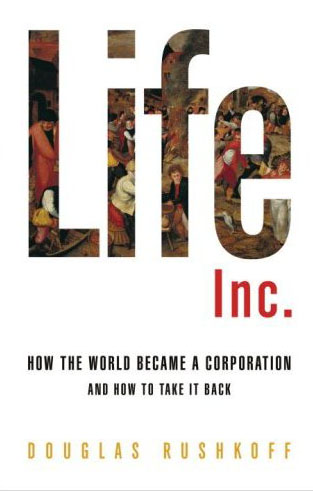 Life Inc.: How the World Became a Corporation and How to Take It Back
Life Inc.: How the World Became a Corporation and How to Take It Back, by Douglas Rushkoff (Random House):Rushkoff tackles a big and loaded subject—the rise and power of corporations in our lives—in a fascinating, at times humorous, and always erudite way. While Rushkoff is sometimes guilty of becoming shrill and overreaching, this is one of those books that makes you think about mainstream ideas we never stop to question: Why do we equate productivity with busyness? Why do we have the money system that we do? Why do corporate rights so often trump human rights? You won’t always agree with Rushkoff, but you might find yourself benefitting from the arguments he inspires in your head.
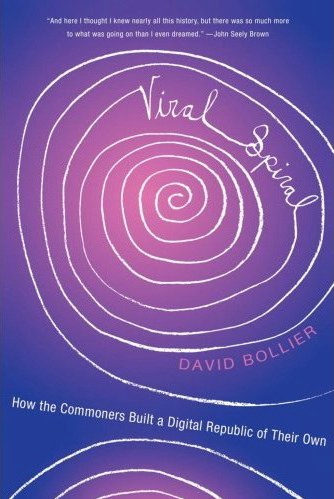 Viral Spiral: How the Commoners Built a Digital Republic of Their Own
Viral Spiral: How the Commoners Built a Digital Republic of Their Own, by David Bollier (New Press): In Viral Spiral, Bollier makes an argument that is central to our work here at Shareable.net: That the rise of open source software, social media, and peer-to-peer swapping are creating the model for a new kind of culture and economy based on sharing. "A world organized around centralized control, strict intellectual property rights, and hierarchies of credentialed experts is under siege," writes Bollier (who edits our allied site, On the Commons). "A radically different order of society based on open access, decentralized creativity, collaborative intelligence, and cheap and easy sharing is ascendant." At root, Viral Spiral is a history book, but it's also a call to arms, asking us to apply Internet principles of sharing to all spheres of life. Read this one along with Cory Doctorow's novel Makers!
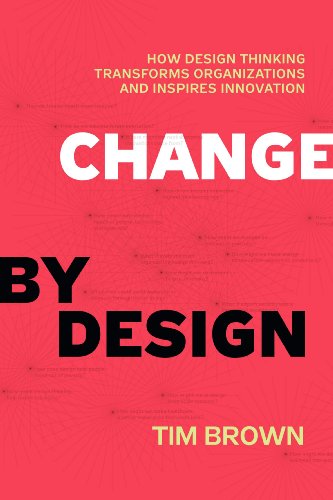 Change by Design: How Design Thinking Transforms Organizations and Inspires Innovation
Change by Design: How Design Thinking Transforms Organizations and Inspires Innovation, by Tim Brown (Harper Business): While the book teeters on over-promoting the organization that Brown leads, IDEO, he does a great job at articulating the critical role of “design thinking” in turning “What if?” and “How might we?” into “What we can do is…” Design, Brown reminds us, is a valuable tool we can use to identify and create shared solutions that fulfill our consumer whims and desires in ways that help us to share, not hoard, our stuff. This goes for the process as well as the products. "A process fed by design thinking will feel chaotic to those experiencing it for the first time," Brown writes. But "the linear, milestone-based processes" that define traditional business practices, he argues, result in products that are boring, easy to copy, and ultimately unsustainable. "It is better to take an experimental approach: share processes, encourage the collective ownership of ideas, and enable teams to learn from one another."
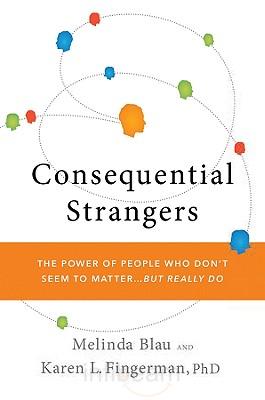 Consequential Strangers: The Power of People Who Don't Seem to Matter. . . But Really Do
Consequential Strangers: The Power of People Who Don't Seem to Matter. . . But Really Do, by Melinda Blau and Karen L. Fingerman (WW Norton): This is a “big idea” book about a beautiful and simple notion: that we should look beyond our “primary relationships” (friends, family) to casual acquaintances in order to gauge the quality and meaning of our lives. It’s our baristas and bartenders, doctors and hairdressers, basketball buddies and Facebook friends “who bring novelty and information into our lives, allow us to exercise different parts of ourselves, and open us up to new opportunities.” The authors combine social theories such as Mark Granovetter’s “The Strength of Weak Ties” and Marilyn Brewer's idea of “optimal distinctiveness” with accessible stories and anecdotes to get across some wonderful ideas around how important people on the peripheries of our lives can be to our personal satisfaction and well being.
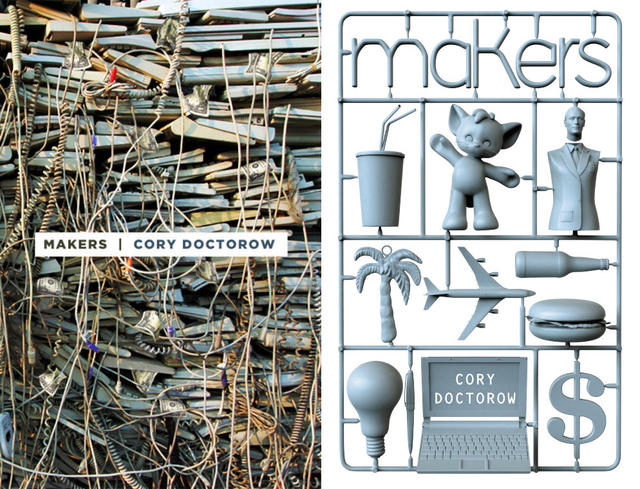
Makers, by Cory Doctorow (Tor Books): Makers is the only novel on this list, and make no mistake: It is a novel, meaning that it has complicated characters, vivid settings, and a compelling plot. But, like all good science fiction, it's also a novel of ideas: Doctorow takes today's mashable, DIY, Internet-based culture and extrapolates it into the future, imagining the social and economic impact of a device that can mash-up physical objects the same way we now mash-up video on YouTube. The result is a snapshot of the shareable future, both a warning and a promise.
 Manhood for Amateurs, by Michael Chabon (Harper) and Bad Mother
Manhood for Amateurs, by Michael Chabon (Harper) and Bad Mother, by Ayelet Waldman (Doubleday): These two separate books, written by two separate and very successful authors who happen to be married, portray shared parenting in all its contradictory glory. Neither Chabon (best know for his Pulitzer-winning novel, The Amazing Adventures of Kavalier & Clay
) nor Waldman (author of Love and Other Impossible Pursuits
, coming soon to a theater near you) are propagandists. They’re writers, and that means they write gracefully and honestly about the pain of their lives as well as the joys, and about everything in between. Taken together, these two books might provide emotional support, inspiration, and meaning to couples trying to share parenting in the twenty-first century. "Lucky me that I should be permitted the luxury of choosing to find the intimacy inherent in this work that is thrust upon so many women," Chabon writes, speaking for many fathers with equal parts of satisfaction and resentment. "Lucky me."
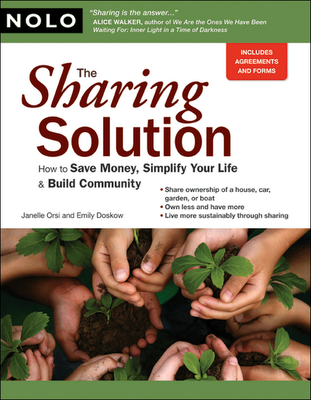 The Sharing Solution: How to Save Money, Simplify Your Life & Build Community
The Sharing Solution: How to Save Money, Simplify Your Life & Build Community, by Janelle Orsi and Emily Doskow (Nolo): When I met for the first time with Free Range Studios, which designed Shareable.net, a copy of The Sharing Solution sat on the conference table. I took it home, read it, and discovered the blueprint we need for living shareable lives. From housing to gardening to bike repair to childcare to petcare, attorneys Orsi and Doskow (now both Shareable.net columnists) explain how to break down the real and imagined barriers that keep us from sharing our stuff and our lives. The results: more community, lower costs, and reduced impact on the environment. Just browsing through The Sharing Solution will open your eyes to a whole new way of life. And if more people read this book, which I hope more people will do, we’ll live in a better world.
 Who Owns the World? The Rediscovery of the Commons, Silke Helfrich, Ed. (oekem Verlag, Berlin): While the pitched battles over intellectual property on the Internet propelled the idea of the commons to the foreground, and led to the demise of Napster and the founding of the Creative Commons, a dedicated cadre of activists and academics across the globe have quietly advanced the understanding of the commons – both digital and embodied versions – through a substantive body of work. Who Owns the World is a collection of essay from this community's top thinkers including Richard Stallman, Sunita Narain, Ulrich Steinvorth, Peter Barnes, David Bollier, and Elinor Ostrom. The later recently won a Nobel Prize for her work bringing awareness of the commons to perhaps an all time high. Fittingly, the book is freely available online, though only available in German for now.
Who Owns the World? The Rediscovery of the Commons, Silke Helfrich, Ed. (oekem Verlag, Berlin): While the pitched battles over intellectual property on the Internet propelled the idea of the commons to the foreground, and led to the demise of Napster and the founding of the Creative Commons, a dedicated cadre of activists and academics across the globe have quietly advanced the understanding of the commons – both digital and embodied versions – through a substantive body of work. Who Owns the World is a collection of essay from this community's top thinkers including Richard Stallman, Sunita Narain, Ulrich Steinvorth, Peter Barnes, David Bollier, and Elinor Ostrom. The later recently won a Nobel Prize for her work bringing awareness of the commons to perhaps an all time high. Fittingly, the book is freely available online, though only available in German for now.
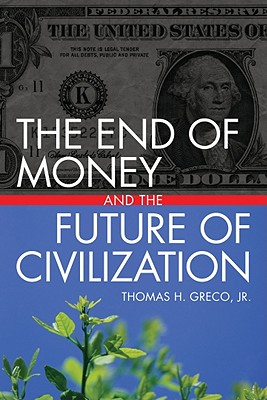 The End of Money and the Future of Civilization, by Thomas H. Greco Jr. (Chelsea Green): Is money an external circumstance, like weather or topography? Or is it an artifact, created by humans for a specific purpose? Greco trends to the latter, a sentiment that's easy to pick up on. Consider Alan Greenspan's comments on the pre-crash stock market's "irrational exuberance." He's linking that thing we call "the economy" intimately with human nature — our emotions, perceptions, powers of interpretation. To this Greco adds intent. Money, he says, is an "information system" that enables a "usury net" to weild debt as an instrument of economic, social and political control. His solution is to create new systems of exchange based in a "credit commons," production-based vouchers, and other innovations of psychology and method.
The End of Money and the Future of Civilization, by Thomas H. Greco Jr. (Chelsea Green): Is money an external circumstance, like weather or topography? Or is it an artifact, created by humans for a specific purpose? Greco trends to the latter, a sentiment that's easy to pick up on. Consider Alan Greenspan's comments on the pre-crash stock market's "irrational exuberance." He's linking that thing we call "the economy" intimately with human nature — our emotions, perceptions, powers of interpretation. To this Greco adds intent. Money, he says, is an "information system" that enables a "usury net" to weild debt as an instrument of economic, social and political control. His solution is to create new systems of exchange based in a "credit commons," production-based vouchers, and other innovations of psychology and method.
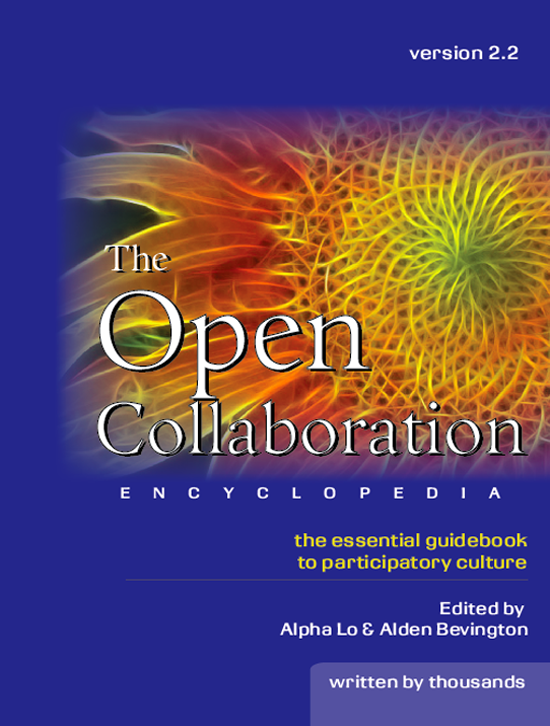 The Open Collaboration Encyclopedia, Alpha Lo and Alden Bevington, Eds. (Pioneer Imprints): Clay Shirkey's Here Comes Everyone may be the buzzed-about Bible of the phenomenon of open collaboration, but it's a Great Man theory to The Open Collaboration Encylopedia and its, like, massively crowdsourced, 550+ pages of content covering everything from co-ops and chaordic theory to unconferences and worldwork. Though rich with critical alternatives to each concept, the cladistics system of keywords and symbols makes it look, oddly, like a woo-woo chemistry manual for hermeneutic scholars. There were many worthy books to consider for this list, but none that put the "shareable" ideas described within to use in producing the artifact. The Open Collaboration Encyclopedia walked it's talk and as a how-to manual for open collaboration can help you do the same. And as you would expect, it's an open textbook available under a Creative Commons license that you can read for free here.
The Open Collaboration Encyclopedia, Alpha Lo and Alden Bevington, Eds. (Pioneer Imprints): Clay Shirkey's Here Comes Everyone may be the buzzed-about Bible of the phenomenon of open collaboration, but it's a Great Man theory to The Open Collaboration Encylopedia and its, like, massively crowdsourced, 550+ pages of content covering everything from co-ops and chaordic theory to unconferences and worldwork. Though rich with critical alternatives to each concept, the cladistics system of keywords and symbols makes it look, oddly, like a woo-woo chemistry manual for hermeneutic scholars. There were many worthy books to consider for this list, but none that put the "shareable" ideas described within to use in producing the artifact. The Open Collaboration Encyclopedia walked it's talk and as a how-to manual for open collaboration can help you do the same. And as you would expect, it's an open textbook available under a Creative Commons license that you can read for free here.
Now tell us in comments: What do you think were the most important books about sharing in 2009?
Next: Books We're Looking Forward to in 2010!
Thanks to Rachel Botsman, Neal Gorenflo, Michel Bauwens, David Bollier, and Silke Helfrich for their suggestions for this piece.


